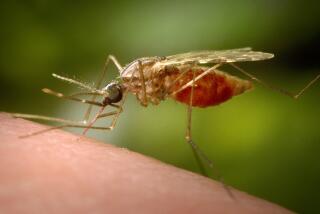Fever? Chills? You May Not Be Home Free
- Share via
Two weeks after returning to Southern California from Africa, a professor came down with a fever--and high anxiety. He called the travel medicine doctor he had seen before his trip and asked for an appointment. “I wasn’t good about taking my malaria medicine,” he confessed.
While many travelers have learned to check in with their physician or a travel medicine clinic about immunizations and other precautions, not all may be aware that the post-trip period can bring its share of unpleasant health surprises. Some diseases don’t show up until after the trip is over.
Experts aren’t recommending a routine post-trip stop at the doctor’s office for short-term travelers--those who have been overseas for three months or less and who return feeling fine.
But it does make sense, they say, for returning travelers to learn what to watch out for so they can nip any travel-related ailments in the early stages.
Fever is one of the common warning signs that returning travelers should take note of, especially if they have been to areas where malaria is present, says Dr. Brian G. Terry, the Pasadena travel medicine specialist who took care of the professor (more about him later). An elevated temperature can be a symptom of malaria, dengue fever and other illnesses.
Fever of 100 degrees or more in a returning traveler from an area in which malaria is endemic should be considered an emergency until the disease is ruled out, says Dr. J.D. MacLean, director of the McGill University Centre for Tropical Diseases in Montreal. The diagnosis, based on a blood test, can take as little as 15 minutes, he says.
Even if you have taken your antimalarial pills faithfully, see a doctor if you develop a fever after your return, Terry advises, because “they are not 100% effective.” Signs of malaria, which can include flu-like symptoms such as chills and headache, can begin as early as six days after exposure or as much as several months later, according to the Centers for Disease Control and Prevention. Several drugs and drug combinations are effective in treating the disease.
Dengue fever, a viral disease transmitted by infected mosquitoes, should also be ruled out in patients with a fever who have been to an affected area within the previous three weeks, the CDC advises. There is no specific treatment for dengue fever, according to the CDC, and most patients recover on their own. (A rarer form, dengue hemorrhagic fever, is more severe and sometimes fatal.)
Intestinal symptoms such as diarrhea also bear watching, MacLean says. Simple traveler’s diarrhea, usually caused by E. coli or other common microorganisms, usually clears up in three to seven days. But intestinal problems can be symptoms of other infections, such as giardiasis, MacLean says. These can hang on longer and should be treated with an anti- microbial drug.
When to see a doctor? If your intestinal problems are accompanied by severe abdominal pain, bloody diarrhea or fever, or if you get dizzy on standing up (which can indicate dehydration), you need medical help, MacLean says.
Skin lesions can also signal trouble. Travelers may have contracted hookworm, which can enter through a tiny break in the skin (typically in a person walking barefoot), sometimes causing itching and rash at the point of entry. Some hookworms can be transported in the bloodstream to the lungs, then coughed up, swallowed and sent to the intestines. They can live there for years, each producing up to 25,000 eggs per day, Terry says. The infestation, which may produce anemia, abdominal pain, diarrhea and loss of appetite--or no symptoms at all--can be treated with medication.
Another illness that can produce skin lesions is leishmaniasis, a parasitic disease transmitted by the bite of sand flies. It occurs in tropical and subtropical climates, most often in rural areas. In its skin form, the disease is marked by sores that can develop weeks to months after a bite from an infected fly, according to the CDC. The visceral form, which attacks internal organs, can take months or even years to become evident, with symptoms such as spleen and liver enlargement and fever. Drug treatment is the therapy of choice.
“Any skin lesion that lasts more than three weeks should be looked at,” MacLean says.
Besides paying attention to fever, intestinal problems and skin symptoms, returning travelers may become anxious about health risks if they haven’t followed preventive advice, Terry says. These are the patients he refers to as “oops” people: “They say, ‘Oops, I didn’t take my malaria medicine very well.’ ‘Oops, I had unprotected sex.’”
Some want to be tested even though they don’t have symptoms. Depending on their exposures and behavior, Terry says, he may screen to rule out specific problems, such as sexually transmitted diseases or parasitic infections.
The professor with the fever who went to see Terry tested negative for malaria. But after questioning him about his other activities--which included having unprotected sex with a local woman and eating and drinking whatever he pleased--Terry decided to screen for sexually transmitted diseases and hepatitis A, a viral disease that is contracted from contaminated water or food.
Considering his risky behaviors, the professor was relatively lucky. His only positive test result was for hepatitis A, a liver inflammation that causes jaundice, fever and nausea. There is no specific treatment other than bed rest, and the professor recovered--although he was sick for a month and a half. Terry had offered him the hepatitis A vaccine before his departure, but the professor thought he had already received it in preparation for a prior trip.
Even if returning travelers don’t notice any symptoms, they should mention overseas trips to their doctors during routine visits, Terry and MacLean advise. If a mysterious symptom appears later, the physician may have an easier time making the diagnosis if he knows the patient’s travel history.
More to Read
Sign up for The Wild
We’ll help you find the best places to hike, bike and run, as well as the perfect silent spots for meditation and yoga.
You may occasionally receive promotional content from the Los Angeles Times.






